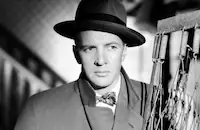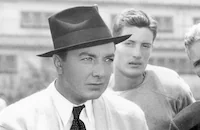Daniel Boone, Trail Blazer
Cast & Crew
Albert C. Gannaway
Bruce Bennett
Lon Chaney [jr.]
Faron Young
Kem Dibbs
Damian O'flynn
Film Details
Technical Specs

Synopsis
In 1775, Daniel Boone leads his family and a small group of settlers into the Kentucky wilderness to establish a fort and trading post for the Transylvania Company. His son James and several other scouts follow the main party, but when the smaller party camps for the night, they are attacked by a group of Shawnee Indians, and young James is killed and scalped. A British general named Hamilton has been offering the Shawnees rifles in exchange for the scalps of American rebels. Most of these deals are brokered by Simon Girty, a Cherokee who speaks with a French accent and wears a British uniform. When Boone finds his son's body and carries it back to the small fort, Andy Callaway, another settler, argues that they should return to civilization. Boone, however, believes that their settlement of Boonesboro will be the gateway to the West and insists on remaining. Andy's son Faron, who is loved by Boone's daughter Susannah, shares Boone's enthusiasm. Soon afterward, Blackfish, chief of the Shawnee Indians, visits the fort in the company of Girty to warn Boone against settling the area. Boone and Blackfish are blood brothers, but when Boone calls Girty a "serpent," the chief sternly replies, "He's Shawnee now." Worried about the safety of his brother Squire, who is bringing a group of children to the fort, Boone and several other settlers head out to meet the wagons. The children, several of them Boones, sing about "Dan'l Boone," but just before the famed pioneer arrives, the wagons are captured by Shawnees. That night, Boone uses cunning to free the wagon from the Indians, but two of the men are taken prisoner by the Shawnee. Boone later walks into the Shawnee village, but before Blackfish talks peace with him, he is forced to endure the blows of many of the warriors' tomahawks. At a council meeting, Boone argues that the settlers want only to live in peace and share the wealth of the land with the Indians. Blackfish agrees to send his two sons to meet at a waterfall to discuss peace, but when the young warriors arrive, Girty secretly has them shot. Holding the body of one of his sons aloft, Blackfish later cries, "The earth will run red with the blood of white men!" and Boone barely escapes with his life. Later, Boone finds White Fox, Blackfish's other son, by the waterfall, mumbling "Girty!" Boone carries the feverish White Fox back to the fort, where he fervently hopes the Indian will regain his health. At night, several warriors quietly enter the fort, and although Boone orders the settlers to hold their fire, Callaway shoots, shouting, "Well, they're savages, aren't they?" One of the white prisoners escapes from the Shawnee village, but as he approaches the fort, the full contingent of attacking Indians begins shooting. The settlers fight hard but are soon overwhelmed, and things look hopeless when White Fox dies. Callaway is killed while approaching Blackfish and Girty with a white flag, and afterward, Blackfish enters the fort. He is shocked to see Boone supporting the upright body of White Fox, who, although dead, stares ahead with open eyes. Boone quietly asks Blackfish to act as though he is speaking with his son, and when Boone points the dead man's hand toward Girty, the villain assumes that his treachery has been revealed. As Girty turns to run away, Blackfish flings an axe at him. The bereaved chief then carries his son's body away from the fort, leaving it open to future westward travelers.

Cast

Bruce Bennett

Lon Chaney [jr.]
Faron Young
Kem Dibbs
Damian O'flynn
Jacqueline Evans
Nancy Rodman
Freddy Fernández
Carol Kelly
Eduardo Noriega

Fred Kohler Jr.
Gordon Mills

Claude Brook
Joe Ainley
Lee Morgan
Crew
Leon Barsha
Jaime L. Contreras
Billy Coontz
Ben Costanten
Jack Draper
James L. Fields
Albert C. Gannaway
Albert C. Gannaway
Charles Heard
Tom Hubbard
Tex Lambert
Raúl Lavista
Hal Levy
Fernando A. Martínez
William O'dwyer
Jack Patrick
Nicolás De La Rosa
C. J. Ver Halen
Robert G. Vreeland

Film Details
Technical Specs

Quotes
Trivia
Notes
The working titles of this film were Adventures of Daniel Boone, Dan'l Boone and Attack on Boonesboro. An onscreen copyright notice states: "Copyright MCMLV by Daniel Boone Inc." This statement conflicts with information contained in the copyright registration, in which the claimant is listed as Republic Pictures Corp. and the year of registration given as 1956. Although the film was ultimately shot in Trucolor, according to an July 8, 1955 Hollywood Reporter news item, it was originally planned to be produced in Eastman Color and CinemaScope. Faron Young, who sings "Long Green Valley" in the film, was a country singer who made his motion picture debut in another Republic film, Hidden Guns, released in January 1956 (see below).
As depicted in the film, Daniel Boone and his family guided settlers into Kentucky in 1775, erecting a fort on the site of what is now Boonesboro. From that year on, settlers endured frequent Shawnee and Tory attacks, and in 1778, Boone was briefly held at the Shawnee village of Chillicothe. Simon Girty was an American soldier who in 1878 began to lead Indian and British attacks on Americans along the northern and western frontier. In 1796, he escaped into Canada, and in 1818, he died. Henry Hamilton, who commanded the frontier post of Detroit, was known among the region's Indians as the "Hair Buyer" because he paid bounties for rebel scalps during the Revolution.
Because the picture was filmed in Mexico rather than Kentucky, Congressman Eugene Siler attempted to organize a Kentucky boycott of the film. A March 29, 1956 Daily Variety news item noted that the AFL-CIO had also planned a boycott of the film, in order to "teach a lesson to an American employer who ran away to a foreign country whereby he escaped paying American union wage rates to American workmen." Gannaway-Ver Halen Productions asserted that inclement weather prevented shooting in Kentucky, the story's locale. Producer Albert C. Gannaway also claimed that some of the film's financing originated in Mexico. A April 26, 1956 Los Angeles Times news item reported that the boycott had been lifted following "an agreement on the part of the producer not to engage in 'runaway' foreign production in the future." For additional information on other films featuring Daniel Boone, see entry for Daniel Boone (in AFI Catalog of Feature Films, 1931-40).












